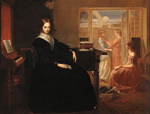
A Dreadful Liability to Impressions
"''The story won't tell [. . .] not in any literal, vulgar way'" (3).
Henry James's The Turn of the Screw (1898)
Points for Reflection
H. James’s The Turn of the Screw (1898), Prologue
- what is this novella’s title, first mentioned in paragraph two, meant to suggest?
- does Douglas’s description of his ghost story as “horrible” and “dreadful,” as marked by “ugliness and horror and pain” unequivocally define the tale later rehearsed as a ghost story with supernatural elements (1-2)? Does Douglas’s claim that the story is “not so simple” and actually rather difficult to “qualify” or categorize suggest that the story should be deemed horrible for reasons unrelated to spirits (1-2)?
- what various strategies does Henry James employ to make this ostensibly gothic tale seem realistic?
- why does the owner of Bly decide that the country is the best place for his two young charges to reside?
H. James’s The Turn of the Screw (1898), chps 1-13
- why might James employ a writing style that is so long-winded and replete with caveats, clarifications, and other qualifications?
- why deploy ambiguous descriptors like “too free” (26) and “infamous” (31) to describe the bad behavior of Peter Quint, along with equivocal clauses like “‘He did what he wished [. . .] With them all’” (32)?
- what is the real, unstated, reason for Miss Jessel’s leaving her job as governess?
- does James’s reader have any means at her/his disposal of intuiting the possibilities which so horrify the narrator--the “depths” which she so fears (30 bot, 33 top)?
- in many ways, this tale is a case study examining the design of a particular mind and temperament--that of the governess and narrator. What various factors appear to motivate her at the beginning of her tale, and do these variables shed any light on the accuracy of her perceptions?
- in many ways, this tale is a case study examining the design of a particular mind and temperament--that of the governess and narrator. What various factors appear to motivate her at the beginning of her tale, and do these variables shed any light on the accuracy of her perceptions?
- the tale’s central character and narrator, we learn early on, was raised in the home of a poor country parson, or pastor (5). Does her background appear to have instilled in her a stolid faith that helps her cope with difficult circumstances?
- is there any evidence that the narrator reads too much into the circumstances she faces? Does she wrongly identify strange forces in quite normal events, or is she actually encountering something otherworldly?
- what evidence does James provide that suggests the narrator is indeed witnessing supernatural events?
- in what ways do Flora and Miles exceed what the adult mind (specifically that of the governess) traditionally expects from children in this period? Are these characteristics extraordinary enough to be considered inhuman?
- in what ways do the children proves themselves less than perfect?
- the narrator frequently introduces the notion of sanity into both her conversations with Mrs. Bly and her silent colloquies with herself, often asserting the strength of her own mind in the process. Doth the lady protest too much?
- does the narrator believe that her deepened sensibility makes her more, or less, attuned to the supernatural?
- why does the narrator (the governess) hesitate before “going on with the record of what was hideous at Bly” (39)?
- does Henry James implicitly validate the socioeconomic prejudice which causes Mrs. Grose to look at the liaison between Miss Jessel (a “lady”) and Peter Quint (“so dreadfully below”) as horrifying (32 top), and to consider the constant companionship of Miles and Quint as “bad” (34-35)?

The Governess (1844)
Richard Redgrave
Dr. Paul Marchbanks
pmarchba@calpoly.edu
![]()
